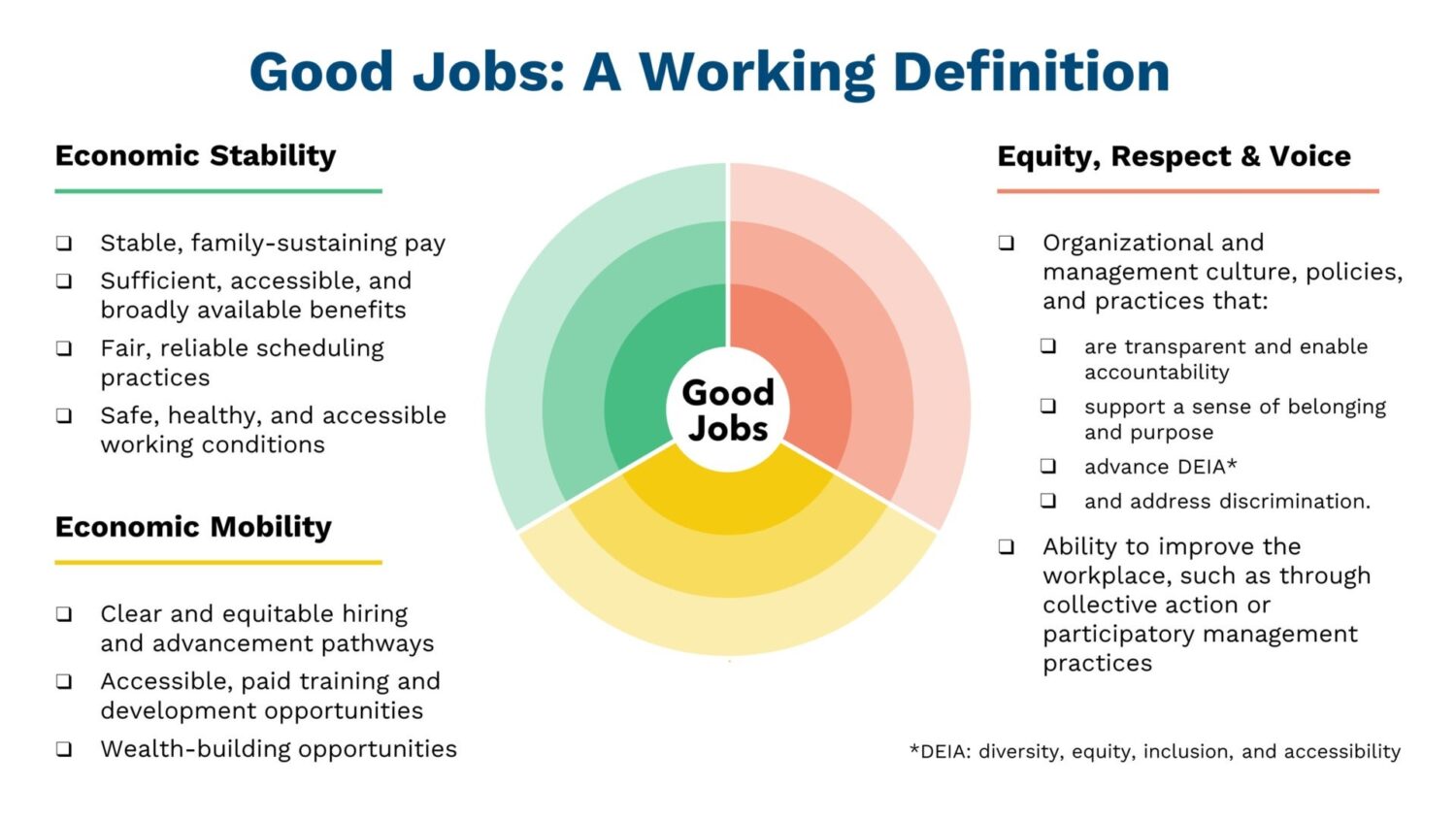Good Jobs Champions Group
Statement on Good Jobs
Para leer esta página en español, haga clic aquí.
Dozens of leaders in business, labor, workforce development, and policy have set forth an evidence-based, shared definition of job quality as part of the Good Jobs Champions Group, an initiative of the Aspen Institute Economic Opportunities Program and the Families and Workers Fund.
Good jobs are essential to a healthy economy, successful businesses, strong communities, thriving families, and a well-functioning democracy. Yet only 44 percent of working people in the US report having a “good job,” defined by satisfaction with the job characteristics they care most about. More than 30 percent of the workforce — 53 million people and disproportionately women, people of color, and immigrants — struggle with low wages. Millions more lack adequate benefits, face discrimination and harassment, and cope with other daily challenges that are the consequence of low-quality jobs.
The ideals of America as the Land of Opportunity are undermined by the reality that millions of people work hard, play by the rules, but can barely get by — never mind get ahead. The work of women and people of color especially has been devalued, reflecting the racism and sexism embedded in our labor market. Workers without higher education are too often described as “low-skill” and their contributions belittled. Even workers satisfied with their pay may lack advancement opportunities or the ability to shape a positive workplace. Work of all kinds is too often dehumanized, with jobs designed for efficient processes without regard to how people are engaged in the shared work of an organization.
It does not have to stay this way. Workers, businesses, governments, labor unions, worker centers, philanthropies, and community organizations can work together to address the job quality crisis. A critical first step is a shared definition of good jobs — a north star to guide action toward good jobs and a touchstone that provides a common language to discuss priorities. This statement puts forth such a definition, supported by more than 100 organizations and leaders representing business, labor, workforce development, policy, philanthropy, and research. The definition is both foundational and aspirational — these job quality indicators are foundational to all good jobs in all sectors and all stages of a career with the aspiration of creating good jobs where all or most of these indicators are high.

1. Economic stability
Good jobs provide workers with confidence that they can meet their basic needs — for healthy food, a safe place to live, healthcare, and other essentials — for themselves and their families now and in the future.
2. Economic mobility
Good jobs provide clear pathways into them and an equitable chance at hiring. They provide mobility over a career through opportunities to learn, to advance to new positions, to be recognized for accomplishments, to save, and to build wealth.
3. Equity, respect, and voice
Good jobs respect the contributions that people bring to an organization, without regard to their gender, race, ethnicity, level of educational attainment, or other demographic characteristics. They engage workers in understanding their work and how it advances the goals of the organization. Workers in good jobs have the power to ensure that concerns about working conditions or ideas for improving workplaces will be fairly considered and acted upon.
Good jobs rest on a foundation of our existing labor laws, which have established basic standards to eliminate child labor; set minimum pay standards; regulate working hours; improve worker safety and health; prohibit discrimination based on race, ethnicity, national origin, sex, sexual orientation, gender identity, pregnancy, religious belief, age, or disability status; and recognize the right of workers to form a union and bargain collectively should they choose to do so. Respecting these laws as a shared set of rules to protect human dignity is a key component of creating good jobs and government enforcement plays a critical role in ensuring these values are protected in our economy. Good jobs provide these types of protections even if their particular industry may be excluded from these laws. We also recognize that effective managers support good jobs by looking for opportunities for direct reports to advance and develop, and helping to build equitable, respectful, and accountable teams and cultures.
We see this shared definition of good jobs as an essential first step in a renewed movement toward good jobs for all. We recognize that jobs are not easily separated into “good jobs” and “bad jobs,” and we use the term “job quality” to describe the actionable continuum of moving from low quality to higher quality. The undersigned recognize the urgency and potential of this moment and are committed to working toward this vision for good jobs through our daily work. We invite you to join us.
Please sign on to this shared definition of job quality here.
About the Economic Opportunities Program
The Aspen Institute Economic Opportunities Program advances strategies, policies, and ideas to help low- and moderate-income people thrive in a changing economy.
Join Our Mailing List
To receive occasional emails about our work — including new publications, commentary, events, fellowships, and more — join our mailing list.
Connect on Social Media
For news and updates every day, connect with us on the social media platform of your choice.




